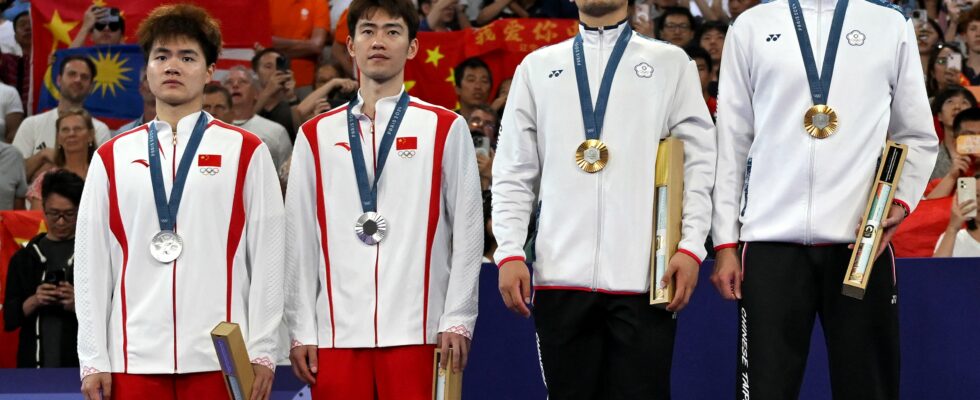“Go Taiwan!” A sign written in Mandarin that seemed innocent at first glance. But on August 2, during the badminton semi-final at the Arena Porte de la Chapelle, the photo went viral on the web. Alongside the Taiwanese supporter who was standing in the stands holding the banner, a security guard, who had come closer, spoke to someone via his walkie-talkie. A few seconds later, the banner was violently torn down by a supporter who was presumed to be Chinese. The man was subsequently caught and sent out of the stadium. Several videos showing the incident circulated on social media and caused a stir among Taiwanese internet users.
For the Taiwanese, the Olympics are not just about the number of medals won; they are also a way to increase the visibility of the island in the rest of the world. Except that for the nationals of this territory claimed by China and not recognized by the vast majority of the international community, supporting their country is a dangerous game. Even in France.
The altercation was later condemned by the Taiwanese government, which ordered French authorities to intervene. But according to Sandy Hsieh, president of the Association of Taiwanese in Europe, this “is not a unique incident.” […] “During a table tennis match, someone took a picture of me and reported it to the authorities,” swears this Taiwanese woman who lives in Paris, and who was also holding up a placard to encourage Taiwan. According to her, the author of the photo is “certainly a Chinese national.”
Victory against China in badminton
For many Taiwanese, the incidents in the French capital reflect China’s political pressure on the island of 24 million people. In a group of 200 people set up on the social network Line – the most widely used in Taiwan – Taiwanese fans mentioned dozens of similar incidents in Paris.
While athletes compete under the name “Chinese Taipei,” a designation that arose from a consensus between Taiwan and the Olympic committee in 1981, flags representing the Republic of China, Taiwan’s official name, have been banned from stadiums, swimming pools and gymnasiums since the country was expelled from the United Nations in 1971 in favor of the People’s Republic of China.
While most Taiwanese fans at the French Olympics respect this rule, any sign mentioning Taiwan is almost systematically filtered by security. “They took away a picture of bubble tea,” complains Tsai I-ling, a fan who came to Paris to volunteer during the Olympic season. Similarly, Nancy*, a Taiwanese journalist, reports long discussions with security agents because she was carrying a bag with the name Taiwan on it, offered by the Taiwanese pavilion in the Olympic village.
In the stadiums, a poster available to security teams mentions three flags that are prohibited from entering the stands: Russia, Belarus and the Republic of China. “Taiwan is the only democracy banned from the Games, it’s ridiculous…” Nancy laments. Her disappointments continued when she tried to photograph the items confiscated by security: “in their storage room, I discovered all sorts of symbols that refer to Taiwan, black bears, bubble tea…”. But the young woman is quickly reprimanded by the agents who threaten to withdraw her accreditation.
“They took all our fan gear,” laments Tsai I-ling, who came to watch the badminton final. “I cried from start to finish, both with joy and sadness.” The young woman describes an extremely emotional match between Taiwanese duo Lee Yang and Wang Chi-lin and Chinese players Liang Wei-kang and Wang Chang: “French, Malaysian and English fans did not understand why our flags were being taken away. They offered to bring us signs and they shouted ‘Taiwan!’ with us, and no one could stop us from doing that.”
The match ended with a victory for the Taiwanese team against the nationals of a country that constantly threatens their sovereignty on the international stage. The first gold medal for the Chinese Taipei team provoked scenes of jubilation from the Taiwanese in Paris to the streets of Taipei, the capital of Taiwan.
Supporters organize
In France, faced with obstacles, Taiwanese supporters are organizing themselves on social networks: how to pass out signs at competition venues? Some of them had the idea of coming with blank sheets of paper or using iPads. But the subterfuge seems to have been quickly spotted by security agents who no longer allow Taiwanese people to enter with blank sheets of paper or check iPads. Sandy Hsieh suspects that the Line group of supporters has been infiltrated by nationals of the People’s Republic of China.
Despite the general peaceful attitude in the stadiums, it is therefore difficult to escape the tensions between China and Taiwan. “We are not here to fight, but we are treated like rebels, violent people, it is ironic to see that this is happening in a democratic country like France”, seethes Sandy Hsieh. I-ling, the volunteer, reports some political altercations with Chinese volunteers, on the sidelines of the Games: “A Frenchman asked me if Taiwan was part of China, a Chinese woman intervened, to say that we were Chinese”.
*First name has been changed
